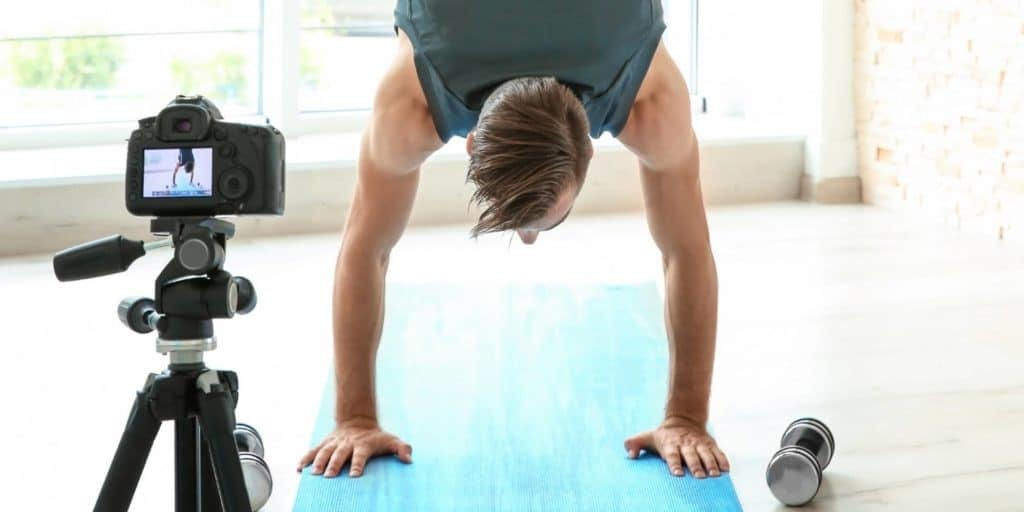Online fitness coaching businesses and online personal training have seen a massive uptake in the past year, with 74% of trainers in the UK moving their business to an online platform via live-streamed sessions. Knowing the ins and outs of coaching fitness online is very important.
Plus, this trend isn’t slowing down soon, with 1 in 4 coaches saying they will now be training more clients online than in-person.
This is, however, still relatively new territory for many new and experienced coaches, with many offering online fitness services for the first time without prior knowledge of the more detailed aspects:
If someone were to ask you what kind of music license you need for online coaching, would you know?
What if you were then asked how this differs compared to live-recorded sessions?
And how should those live recorded sessions be stored to not come under fire from GDPR restrictions?
When building an online fitness business, these are some of the key things that need to be kept in mind. For new and old online fitness coaches, these are important to know. Let’s get into them in more detail then!
4 questions to ask before coaching fitness online to clients
To help you better understand what coaching fitness online really includes, we have created this handy list of 4 key things often overlooked by trainers when taking their business online for the first time. Any online fitness business will need to be able to answer these four questions, they are vital for your and your clients protection, as well as the protection for your business.
The 4 Questions:
#1 – What music licensing do I need?
#2 – What happens if I want to record sessions?
#3 – Why do I need a disclaimer from clients?
#4 – How do I maintain safety while delivering sessions virtually?
1. What music licensing do I need when coaching fitness online?
Just as in face-to-face training, you will need a license to play the music you don’t own the rights to. This is something to consider when building a fitness business, I can speak for everyone when I say music is vital for keeping people focused and motivated while exercising. Doing squats in silence does not feel nice!
Online differs. You will need an additional license to your exercise to music tariff from PPL called a PRS Limited Online Music License (or LOML for short). This is an annual license, covering “communication to the public” (when the music is broadcasted or made accessible to stream or download) and can be used to cover live sessions such as over a streaming service.
There are a few exemptions to this that you should be aware of:
- Pre-recorded sessions for more “on-demand” services need permission from the rights holders to have this music. This can be searched for via the PPL site here.
- The PPL and PRS licence will not cover you if you want to upload your workout to social media such as YouTube. These platforms tend to have agreements with music rights, so you will have to make sure that you’re covered.
TOP TIP – There are many license-free options available that you can use if you are ever unsure about your level of coverage. These can be accessed via sites such as workout music and power music.
2. What happens if I want to record online fitness coaching sessions?

Recording your sessions is a great way to offer a more “on-demand” service for clients and share your work on social media.
When starting an online fitness coaching business, these are great to have when building clientele; you will have a bulk of videos potential clients will be able to watch to get to know your teaching style. However, there are a few legal matters you need to be aware of to make sure you’re complying with GDPR:
- If you’re doing live sessions, you should avoid recording other people. If you need to include anyone else in your recordings, you must get their consent in writing that they are happy to be filmed.
- For on-demand sessions or on an open social media platform where videos are recorded, you should store the recording in a secure platform that is ideally password-protected.
- For all recordings, the file can be stored for three years.
TOP TIP — Recorded sessions are a good idea for evidence of good practice in the unlikely case of legal action. You must make sure all participants are aware they are being recorded and their consent is given in writing.
3. Why do I need a disclaimer from clients?
When dealing with large groups online, you may not be able to do pre-screening documents. Equally, someone in one of your sessions may record your training and try to pass it off as their own. This is your online fitness business; you need to protect it! Disclaimers are one of the easier ways of doing that.
There are a few different types of disclaimers you can use:
- Written disclaimers – This is essential for any online fitness class or personal training session. Clients should have the full document weeks before their first sessions to fully understand what is expected. It should include a contact number in case they need to cancel for any reason (medical emergencies, illnesses, etc.) This should be kept on a secure record file.
- Verbal disclaimers – A verbal disclaimer should highlight to clients the nature of the workouts. It should include recommendations and suggestions of what the client should do if they’re injured or unwell and encourage them to stay hydrated. This should also be used to remind the written agreement and to confirm they have read and understood the conditions.
TOP TIP – Disclaimers are also essential for insurance purposes to set damages, liability, and safety expectations. You must speak to your insurer and find out the best clauses to include in a disclaimer. This will keep both you and your clients safe.
4. How do I maintain safety while delivering online fitness sessions?

The biggest online fitness coaching tip I can give is to maintain the same dedication to safety as if it were an in-person session.
To make sure the client is staying safe throughout the session to avoid injury, check for the following things:
- They are participating in a safe and controlled environment free of impediments (furniture, pets, slippery surfaces).
- They are aware of how to use the equipment safely.
- All instructions are clear and demonstrated so the client can easily copy them at home
- The whole workout journey is covered. From setting expectations and warming up correctly to having an appropriate cooldown and stretching time to avoid injury.
- You should include rehydration and intervals of rest.
Participants should be completely aware of what the activities will be. You should be aware of any impediments that would hinder the clients from completing them.
Key takeaways for coaching fitness online
If you’re a fitness professional or are looking to become one, offering your clients the flexibility to train online is an essential service. It allows you to widen your training community to anyone with an internet connection.
Understanding what’s needed to be legally covered and ensuring you’re providing a safe, enjoyable experience for your clients is vital. When building an online fitness business, it’s crucial to keep on top of your admin to keep you and your fitness business protected.
Now that you’ve got your admin out of the way, the next step is getting noticed!